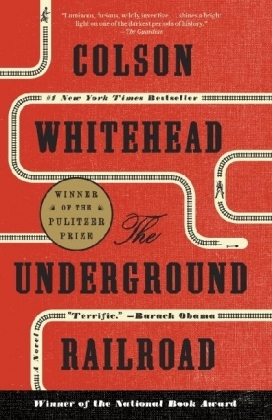
The Underground Railroad
Anchor Books (Verlag)
978-0-525-43570-9 (ISBN)
- Titel ist leider vergriffen;
keine Neuauflage - Artikel merken
Young Cora is a slave on a cotton plantation in Georgia. Conditions are harsh for all the slaves there, but especially grim for her: an outcast even among her fellow Africans, she is coming into womanhood--where even greater pain awaits. When Caesar, a slave who has recently arrived from Virginia, tells her about the Underground Railroad, they decide to take a terrifying risk and escape. In Whitehead's ingenious conception, the Underground Railroad is no mere metaphor: engineers and conductors operate a secret network of actual tracks and tunnels beneath the Southern soil. Unable to find a safe haven, Cora continues on a harrowing flight, state by state, seeking true freedom. As in Gulliver's Travels , she encounters different worlds at each stage of her journey--hers is an odyssey through time as well as space. As Whitehead brilliantly re-creates the unique terrors of the antebellum era, he seamlessly weaves in the saga of America, from the brutal importation of Africans to the unfulfilled promises of the present day. The Underground Railroad is both the gripping tale of one woman's will to escape the horrors of bondage and a powerful meditation on the history we all share.
Colson Whitehead is the New York Times bestselling author of The Noble Hustle, Zone One, Sag Harbor, The Intuitionist, John Henry Days, Apex Hides the Hurt, and one collection of essays, The Colossus of New York . A Pulitzer Prize finalist and a recipient of MacArthur and Guggenheim fellowships, he lives in New York City.
Colson Whitehead is the New York Times bestselling author of The Noble Hustle, Zone One, Sag Harbor, The Intuitionist, John Henry Days, Apex Hides the Hurt, and one collection of essays, The Colossus of New York. His latest book, The Underground Railroad, was published by Doubleday in 2016, and received the National Book Award for Fiction and the Andrew Carnegie Medal for Excellence. A Pulitzer Prize finalist and a recipient of MacArthur and Guggenheim fellowships, he lives in New York City. Visit him online at colsonwhitehead.com
"Terrific." -Barack Obama
"An American masterpiece." -NPR
"Stunningly daring." -The New York Times Book Review
"A triumph." -The Washington Post
"Potent. . . . Devastating. . . . Essential." -Michiko Kakutani, The New York Times
"Whitehead's best work and an important American novel." -The Boston Globe
"Electrifying. . . . Tense, graphic, uplifting and informed, this is a story to share and remember." -People
"Heart-stopping." -Oprah Winfrey
"The Underground Railroad is inquiring into the very soul of American democracy. . . . A stirring exploration of theAmerican experiment." -The Wall Street Journal
"A brilliant reimagining of antebellum America."-The New Republic
"Colson Whitehead's book blends the fanciful and the horrific, the deeply emotional and the coolly intellectual. Whathe comes up with is an American masterpiece."-Ann Patchett, author of Bel Canto
"The Underground Railroad enters the pantheon of . . . the Great American Novels. . . . A wonderful reminder of whatgreat literature is supposed to do: open our eyes, challengeus, and leave us changed by the end." -Esquire
"[Whitehead] is the best living American novelist."-Chicago Tribune
"Masterful, urgent. . . . One of the finest novels written aboutour country's still unabsolved original sin." -USA Today
"Brilliant. . . . An instant classic that makes vivid the darkest, most horrific corners of America's history of brutality against black people." -HuffPost
"Singular, utterly riveting. . . . You'll be shaken and stunned by Whitehead's imaginative brilliance. . . . The Underground Railroad is a book both timeless and timely. It is a book for now; it is a book that is necessary." -BuzzFeed
"Whitehead is a writer of extraordinary stylistic powers. . . . [The Underground Railroad] offers many testaments to Whitehead's considerable talents and examines a deeply relevant and disturbing period of American history."-The Christian Science Monitor
"[An] ingenious novel. . . . A successful amalgam: a realistically imagined slave narrative and a crafty allegory; a tense adventure tale and a meditation on America's defining values." -Minneapolis Star Tribune
"Whitehead's novel unflinchingly turns our attention to the foundations of the America we know now." -Elle
"Perfectly balances the realism of its subject with fabulist touches that render it freshly illuminating." -Time
"I haven't been as simultaneously moved and entertained bya book for many years. This is a luminous, furious, wildly inventive tale that not only shines a bright light on one of the darkest periods of history, but also opens up thrilling new vistas for the form of the novel itself."-Alex Preston, The Guardian
Chapter 1
The first time Caesar approached Cora about running north, she said no.
This was her grandmother talking. Cora's grandmother had never seen the ocean before that bright afternoon in the port of Ouidah and the water dazzled after her time in the fort's dungeon. The dungeon stored them until the ships arrived. Dahomeyan raiders kidnapped the men first, then returned to her village the next moon for the women and children, marching them in chains to the sea two by two. As she stared into the black doorway, Ajarry thought she'd be reunited with her father, down there in the dark. The survivors from her village told her that when her father couldn't keep the pace of the long march, the slavers stove in his head and left his body by the trail. Her mother had died years before.
Cora's grandmother was sold a few times on the trek to the fort, passed between slavers for cowrie shells and glass beads. It was hard to say how much they paid for her in Ouidah as she was part of a bulk purchase, eighty-eight human souls for sixty crates of rum and gunpowder, the price arrived upon after the standard haggling in Coast English. Able-bodied men and childbearing women fetched more than juveniles, making an individual accounting difficult.
The Nanny was out of Liverpool and had made two previous stops along the Gold Coast. The captain staggered his purchases, rather than find himself with cargo of singular culture and disposition. Who knew what brand of mutiny his captives might cook up if they shared a common tongue. This was the ship's final port of call before they crossed the Atlantic. Two yellow-haired sailors rowed Ajarry out to the ship, humming. White skin like bone.
The noxious air of the hold, the gloom of confinement, and the screams of those shackled to her contrived to drive Ajarry to madness. Because of her tender age, her captors did not immediately force their urges upon her, but eventually some of the more seasoned mates dragged her from the hold six weeks into the passage. She twice tried to kill herself on the voyage to America, once by denying herself food and then again by drowning. The sailors stymied her both times, versed in the schemes and inclinations of chattel. Ajarry didn't even make it to the gunwale when she tried to jump overboard. Her simpering posture and piteous aspect, recognizable from thousands of slaves before her, betrayed her intentions. Chained head to toe, head to toe, in exponential misery.
Although they had tried not to get separated at the auction in Ouidah, the rest of her family was purchased by Portuguese traders from the frigate Vivilia, next seen four months later drifting ten miles off Bermuda. Plague had claimed all on board. Authorities lit the ship on fire and watched her crackle and sink. Cora's grandmother knew nothing about the ship's fate. For the rest of her life she imagined her cousins worked for kind and generous masters up north, engaged in more forgiving trades than her own, weaving or spinning, nothing in the fields. In her stories, Isay and Sidoo and the rest somehow bought their way out of bondage and lived as free men and women in the City of Pennsylvania, a place she had overheard two white men discuss once. These fantasies gave Ajarry comfort when her burdens were such to splinter her into a thousand pieces.
The next time Cora's grandmother was sold was after a month in the pest house on Sullivan's Island, once the physicians certified her and the rest of the Nanny's cargo clear of illness. Another busy day on the Exchange. A big auction always drew a colorful crowd. Traders and procurers from up and down the coast converged on Charleston, checking the merchandise's eyes and joints and spines, wary of venereal distemper and other afflictions. Onlookers chewed fresh oysters and hot corn as the auctioneers shouted into the air. The slaves stood naked on the platform. There was a bidding war over a group of Ashanti studs
| Erscheinungsdatum | 17.05.2017 |
|---|---|
| Sprache | englisch |
| Maße | 134 x 203 mm |
| Gewicht | 236 g |
| Themenwelt | Literatur |
| Schlagworte | African American • African American History • Afroamerikaner • Afroamerikaner; Romane/Erzählungen • Alternate History • Antebellum South • Black History • Black History Monthy • ¿blacklivesmatter • Black lives matter • Colson Whitehead • cotton • Emancipation • Englisch; Historische Romane/Erzählungen • fathers day • fathers day books • fathers day gifts • Ferguson • Fiction • Georgia, Geschichte; Romane/Erzählungen • historical fiction • MacArthur Genius Award • National Book Award • national book award winner • Nordamerika, Geschichte; Romane/Erzählungen • oprah • Oprahs Book Club • plantation • Police brutality • Pulitzer Prize • Rassismus; Romane/Erzählungen • Roots • share cropping • Sklaverei; Romane/Erzählungen • Slave Rebellion • Slavery • slave trade • The Underground Railroad • Tuskegee experiment • Whitehouse |
| ISBN-10 | 0-525-43570-0 / 0525435700 |
| ISBN-13 | 978-0-525-43570-9 / 9780525435709 |
| Zustand | Neuware |
| Informationen gemäß Produktsicherheitsverordnung (GPSR) | |
| Haben Sie eine Frage zum Produkt? |
aus dem Bereich


